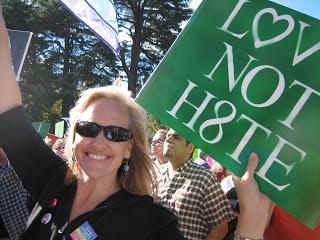
Photo: The author at a marriage equality rally in 2008.
My mom called me “boy crazy.” I had a lot of boyfriends and at age 22 I married, only to divorce at 27.
Again came an onslaught of boyfriends. And then, at age 31, I fell in love with a woman.
The first few months, we spent as much time in bed as possible. It was thrilling, like we were inventing sex. I loved that she worshipped my womanly body. It was a relief to dismiss the male gaze, to dive headfirst into a relationship with someone who, I felt, deeply understood me.
This was in the early 1990s, before Ellen and the Indigo Girls and Melissa Etheridge had come out, before Will & Grace, before most people even hoped for the legalization of same-sex marriage.
I read a lot of books about women who came out later in life. While I identified with their passion, I didn’t see myself in their stories of having hidden their true sexuality for a long time. My “true sexuality” felt like this: I’d loved men, and now I loved a woman.
While many of my friends accepted this change, one interrogated me about how I could suddenly alter myself so radically and then dropped out of my life. Another asked me not to bring my partner around his kids.
When I told my parents, they flipped out. They thought I’d be discriminated against and admitted they were concerned what others would think. My father said I was rejecting men, that I could choose to be straight. I told him I could choose my actions but not my feelings. Besides, I said, there was nothing wrong with loving a woman.
Eventually as they got to know my partner, my parents relaxed. They enjoyed having us around, although we couldn’t sleep together at their house because “only married couples are allowed in the same bed under our roof.”
“But we can’t get married,” I said, “So that’s discrimination.”
When they couldn’t argue against that logic, we were invited to spend the night in their home. Soon, they embraced my partner as another daughter.
Over the years, my parents transformed from shame and silence into outspoken advocates of LGBTQ rights. They were proud of my partner and me as we marched for marriage equality and worked with gay-straight education alliances.
When my books on queer topics were published my mom—also a writer—was thrilled.
Many people saw us as the iconic couple. But the truth was, after a few years together, we rarely had sex. I craved it, but I convinced myself I could live without it—that our partnership was important in so many other ways.
Call it denial. Call it rationalization.
We were caught in a pattern of not admitting to others—or to ourselves—how our relationship was withering.
In 2008, California legalized same-sex marriage. In an unspoken attempt to resuscitate our union, we married, surrounded by family and friends. My father had died a few years before. My mom—at the onset of Alzheimer’s but still vibrant enough to attend—cried happy tears when we were pronounced “wife and wife.”
Six months later, my wife began having an affair with a neighbor, a woman I’d thought was a mutual friend. I was devastated by the betrayal. I begged her to go to marriage counseling, but she had already moved on. It took months for me to accept that we’d needed to break up and that, apparently, the only way it could happen was explosively.
When the phoenix began to rise from the ashes, I started dating men. This was my second coming out. As with the first coming out, most of my friends were okay but a few rejected me, disappearing from my life and unfriending me on Facebook. Just as when I came out the first time, my new life seemed to be a betrayal or a threat.
By this point, my mom—dementia sliding over her brain like a glacier—was living in a care home. When I visited, she’d ask in a halting voice about my wife. I didn’t want to upset her by telling her we’d divorced. In time, she couldn’t speak anymore. I brought my boyfriend to visit, but it was unclear how much she understood.
On my 50th birthday, that boyfriend pulled a ring from his pocket and asked me to marry him. A few days later, I went to visit my mom. Slumped in her wheelchair, she looked up at me. She’d been silent for more than a year.
I hugged and kissed her, sat next to her, and told her we were engaged.
When I held up my ring, she reached out and touched my face. That’s when I knew she was happy for me, no matter the gender of the person I loved.
Author: Kate Evans
Editor: Renée Picard
Image: author’s own











Read 0 comments and reply